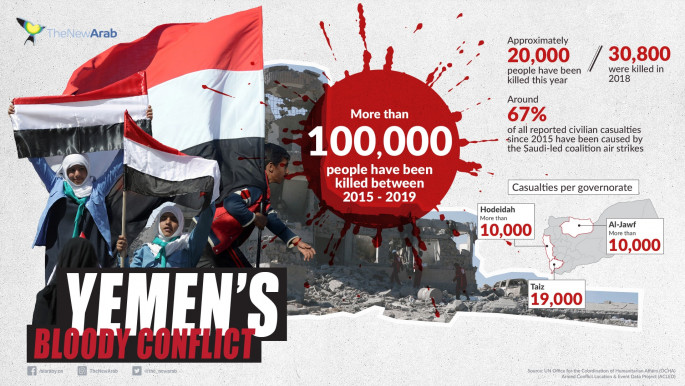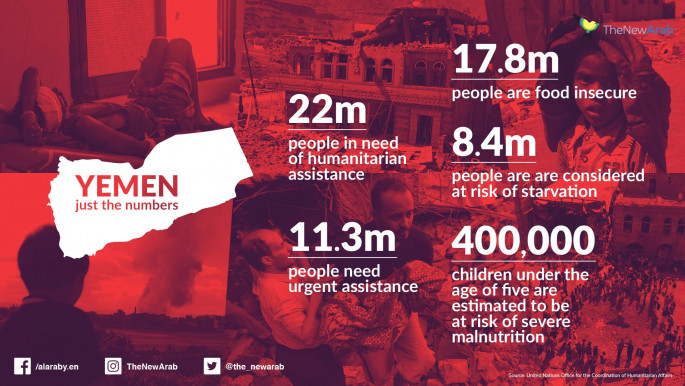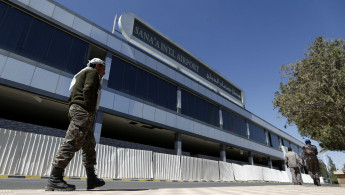Yemen in Focus: Sanaa airport opening 'too little, too late'
But although the move shows critical steps toward peace, it was dismissed by many for what was described as a mere partial opening that was far too late.
According to the Saudi-led coalition, the opening of the airport is designed to finally allow flights transferring those in urgent need of medical care abroad after more than three-years of airspace restrictions and thousands dead.
"For the last three years the Sanaa airport closure has been a death sentence for thousands of women, children and men who died prematurely because they were unable to get treatment abroad. Today's move comes too late for them, but will hopefully save the lives of other Yemenis caught in the conflict and with no available treatment in the country," the Norwegian Refugee Council said at the time of the announcement.
However, Yemenis across social media, many of whom have been displaced since the war and unable to return to visit family, slammed the "conditional" move which came too little, too late.
"How can we celebrate what's rightfully ours?! The sick in northern Yemen have endured unbearable suffering because of the closure of Sanaa airport. Good the airport will be open for them with WHO supervision but the airport should be open to all civilians, unconditionally," Yemeni researcher Afrah Nasser tweeted.
Yemeni journalist Nawal al-Maghafi responded to a tweet by the UN Special Envoy for Yemen which saw the official thank Saudi Arabia for its gesture in opening the airport.
"I have a lot of respect for the @OSE_Yemen ... but this is a complete joke. Why are you thanking the Saudis? Since August 2016 they have deprived Yemenis in the North the basic human right of being able to travel abroad for medical treatment at their OWN expense!" al-Maghafi tweeted.
More than 30,000 people in need or urgent medical care abroad have died due to the lack of access to airports since commercial flights were grounded in 2016, according to ministry of health estimates.
Meanwhile, UN figures from 2017 showed some 20,000 had been denied access to potentially life-saving healthcare due to airspace restrictions.
In Yemen, only 51 percent of health facilities are fully functional and access to medication is scarce.
 |
"While opening the airport to medical patients will be a critical first step, the Saudi-led coalition must go one step further and open it up to commercial flights, which will bring in commercial and humanitarian goods and give Yemenis the freedom to travel overseas – something that in most countries is taken for granted," Aaron Brent, Yemen's country director for NGO Care said.
Billions to sustain
The opening of the airport comes alongside a damning report by the International Rescue Committee (IRC) on Monday which said that if the war in Yemen continued for another five years, it would cost as much as $29 billion just to sustain the current level of humanitarian aid – a sum that amounts to more than the entire annual humanitarian budget globally.
The IRC report said 24 million Yemenis, or 80 percent of the population, need humanitarian aid and 16 million are living on the verge of famine. The war also caused Yemen's economy to shrink by 50 percent, it said.
The group warned that with the current rate of aid, it would take 20 years to return Yemen to pre-conflict levels of child hunger, which is "twice the agreed timetable for ending malnutrition around the world," according to David Miliband, president of the IRC.
An estimated 160,000 Yemeni children under five suffer from severe acute malnutrition, the report said.
"Today's grim predictions are an insight into the colossal cost of the Age of Impunity: where wars are fought with a complete disregard for civilian life and neglected by diplomats charged with ending the violence and holding perpetrators of international law to account," Miliband said.
The IRC said the conflict has displaced three million people, including over 350,000 in 2019 alone.
It called on the US, the UK and France to pressure the warring parties into an immediate and countrywide ceasefire, and to return to peace talks.
Read also: Yemen in Focus: UAE-backed separatists, Saudi-backed government sign power-sharing deal ending Aden's 'mini civil war'
It said a ceasefire brokered by the UN last December in the Yemeni port city of Hodeida, the main passageway for aid and a lifeline for Houthi-controlled areas, prevented massive humanitarian suffering "but the agreement remains a localised effort".
 |
The deal, which also included a prisoner swap, has yet to be fully implemented.
Also, the IRC said the recent power-sharing agreement which ended weeks of infighting between the internationally recognised government and the southern separatists "offers hope for more inclusive peace talks".
Saudi Arabia began holding indirect talks with the Houthis in Oman in September, after the rebel group claimed an attack on Saudi oil infrastructure that affected global energy supplies. The US blamed the attack on Iran, who denied involvement.
The talks are focused on interim agreements, such as re-opening Yemen's main international airport in Sanaa, which was shut down by the Saudi-led coalition in 2016.
The IRC said these developments offer "a rare window of opportunity" to push for peace.
Prisoner swap
On Thursday, more than 100 Houthi rebel prisoners released by the Saudi-led coalition returned to Yemen, one of multiple moves toward a long-anticipated prisoner swap between the warring parties.
Welcoming 128 freed Yemenis at the airport in the capital, Sanaa, Houthi leader Mohammed al-Bukhaiti hailed their arrival as "a first practical step by the Saudis that builds trust".
Dozens more released in Saudi Arabia earlier this week are expected to follow.
Relatives and Houthi officials gathered around the procession of prisoners, kissing their hands.
Their return was a sign the Saudi coalition and Houthis were advancing a UN-brokered deal aimed at ending the war in the Arab world's poorest country.
"There's a positive environment now in Sanaa," Erika Trovar, spokeswoman for the International Committee of the Red Cross, which supervised the captives' arrival, told AP.
"People in the streets are more optimistic about the future... and about the return of more detainees to their families."
Yemeni government officials had described the release as a show of good faith aimed at encouraging Houthis to engage in peace talks.
In September, the Houthis freed over 200 captives who had been held since the rebels seized Sanaa, along with much of northern Yemen, in 2014.
A much larger prisoner swap has been in the making since warring sides agreed to a UN-negotiated deal in Sweden last December.
"This move (Thursday) by the Saudis is lacking," Houthi official Abdul-Qader el-Murtaza said in a statement. "We hope that a full exchange deal will be completed by both parties."
The UN-mediated agreement, which has yet to be fully implemented, also involves a ceasefire in the crucial port city of Hodeida, a main conduit for humanitarian aid and imports into Houthi territory.
Enormous toll
Meanwhile, a parallel report published by Amnesty International shone a light on Yemen's civil war and its enormous impact on people with disabilities, who find themselves on the margins of society and excluded from badly needed humanitarian assistance.
The 50-page report by the London-based global rights group shines a light on the inadequate or nonexistent support for disabled Yemenis – a population "most at risk and most marginalised" in the world's worst humanitarian crisis.
"We understand of course the extent of which the humanitarian response in Yemen has been overstretched," said Rawya Rageh, Senior Crisis Adviser at Amnesty International.
"But this is not just about access to funds. What we are calling for is a change in perspective, a change in approach, that the rights of people with disabilities are addressed at the outset of the crisis."
In a war that has killed more than 100,000 people, the number of wounded and disabled Yemenis is soaring as well, overwhelming health care facilities.
Although verifying data is extremely difficult in the country, the World Health Organisation (WHO) estimates at least 4.5 million Yemenis suffer from disabilities, or 15 percent of the population.
The Amnesty report, citing nearly a hundred interviews with disabled people, government officials and aid workers, and released on the International Day of People with Disabilities, catalogues a daunting range of challenges that force disabled Yemenis to resort to desperate measures to survive.
The research focuses on government-controlled areas in the country's south, as the Iran-allied Houthi rebels, who seized northern Yemen in 2014 and have been fighting the Saudi-led coalition, which backs Yemen's internationally-recognised government, for control of the country, refused to grant the group access.
Not only do disabled people live in a society that treats them as outcasts, Amnesty said, citing numerous cases of discrimination, but overburdened humanitarian organisations exclude them from proper access to aid.
Refugee camps lack accessible toilets, let alone wheelchairs, canes or devices like prosthetic limbs, confining disabled people to tents. Handicapped people described crawling to toilets and making laborious treks to faraway food distribution centres.
Yemen's war has also disrupted official sources of support for those with disabilities, Amnesty said, leaving many without monthly stipends for medical expenses.
Without government help, a 14-year-old boy with cerebral palsy, for instance, has had to stop treatment, worsening his condition, according to Amnesty.
Furthermore, sudden outbreaks of violence have trapped disabled people and separated them from their families, Amnesty found. Many disabled Yemenis are forced to flee their homes without wheelchairs or crutches, carried in the arms of relatives.
Jalila Al-Saleh Ali recounted to Amnesty how she abandoned her mentally ill husband at home while sprinting away from gunfire in the city of Taiz, holding her 16-year-old handicapped son.
As the war in the Arab world's poorest country grinds on, international donors must "do better to ensure these barriers that people with disabilities are facing are eliminated," urged Rageh. "People with disabilities cannot continue to be left behind."
The conflict in Yemen began with the 2014 Houthi rebel takeover of the capital, Sanaa, which prompted the formation of a Saudi-led coalition to reinstate the internationally-recognised government in March 2015.
The war in Yemen has killed over 100,000 people and created the world's worst humanitarian crisis, leaving millions suffering from food and medical shortages.
Sana Uqba is a journalist at The New Arab.
Follow her on Twitter: @Sanasiino
Yemen In Focus is a new, regular feature from The New Arab.



